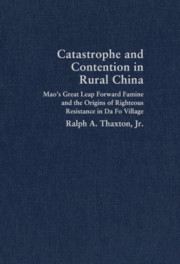 Catastrophe and Contention in Rural China
Catastrophe and Contention in Rural China Book contents
- Frontmatter
- Contents
- Acknowledgments
- Cast of Characters: Da Fo Village (Great Buddha), 1920–1993
- Chronology of Important Events
- Map 1 Provinces of China, neighboring countries, and area of study
- Map 2 Hebei-Shandong-Henan border area, showing location of Da Fo village
- INTRODUCTION
- 1 THE REPUBLICAN ERA AND THE EMERGENCE OF COMMUNIST LEADERSHIP DURING THE ANTI-JAPANESE WAR OF RESISTANCE
- 2 THE ASCENT OF THE VIGILANTE MILITIA: THE VIOLENT ANTECEDENTS OF MAO'S WAR COMMUNISM
- 3 THE ONSET OF COLLECTIVIZATION AND POPULAR DISSATISFACTION WITH MAO'S “YELLOW BOMB” ROAD
- 4 THE MANDATE ABANDONED: THE DISASTER OF THE GREAT LEAP FORWARD
- 5 STRATEGIES OF SURVIVAL AND THEIR ELIMINATION IN THE GREAT LEAP FORWARD
- 6 THE ESCAPE FROM FAMINE AND DEATH
- 7 INDIGNATION AND FRUSTRATED RETALIATION: THE POLITICS OF DISENGAGEMENT
- 8 THE MARKET COMES FIRST: THE ECONOMICS OF DISENGAGEMENT AND THE ORIGINS OF REFORM
- 9 PERSISTENT MEMORIES AND LONG-DELAYED RETALIATION IN THE REFORM ERA
- CONCLUSION
- Bibliography
- Index
- Plate section
3 - THE ONSET OF COLLECTIVIZATION AND POPULAR DISSATISFACTION WITH MAO'S “YELLOW BOMB” ROAD
Published online by Cambridge University Press: 14 May 2010
- Frontmatter
- Contents
- Acknowledgments
- Cast of Characters: Da Fo Village (Great Buddha), 1920–1993
- Chronology of Important Events
- Map 1 Provinces of China, neighboring countries, and area of study
- Map 2 Hebei-Shandong-Henan border area, showing location of Da Fo village
- INTRODUCTION
- 1 THE REPUBLICAN ERA AND THE EMERGENCE OF COMMUNIST LEADERSHIP DURING THE ANTI-JAPANESE WAR OF RESISTANCE
- 2 THE ASCENT OF THE VIGILANTE MILITIA: THE VIOLENT ANTECEDENTS OF MAO'S WAR COMMUNISM
- 3 THE ONSET OF COLLECTIVIZATION AND POPULAR DISSATISFACTION WITH MAO'S “YELLOW BOMB” ROAD
- 4 THE MANDATE ABANDONED: THE DISASTER OF THE GREAT LEAP FORWARD
- 5 STRATEGIES OF SURVIVAL AND THEIR ELIMINATION IN THE GREAT LEAP FORWARD
- 6 THE ESCAPE FROM FAMINE AND DEATH
- 7 INDIGNATION AND FRUSTRATED RETALIATION: THE POLITICS OF DISENGAGEMENT
- 8 THE MARKET COMES FIRST: THE ECONOMICS OF DISENGAGEMENT AND THE ORIGINS OF REFORM
- 9 PERSISTENT MEMORIES AND LONG-DELAYED RETALIATION IN THE REFORM ERA
- CONCLUSION
- Bibliography
- Index
- Plate section
Summary
In the year following the Communist Party victory of October 1, 1949, most of Da Fo's farmers settled into small-scale, family-based tilling routines, and they began to supplement family income through increased market participation. In this so-called honeymoon period, roughly late 1950 to early 1955, free trade in periodic markets, agricultural fairs, temple festivals, and martial arts contests made a comeback, and villagers focused on finding marriage partners, reuniting separated families, making babies, and reasserting the symbolic rituals associated with patrilineal descent and extended kinship. Lunar New Year banquets and Qingming festivals, in which people swept ancestral grave sites and burned incense and paper money to honor ancestors, became the order of the day. During this period, Da Fo's fiercely independent smallholders equated the success of the recent Communist-led revolution with the freedom to farm their own fields. They were well positioned to plow the profits from renewed salt production back into agriculture, and they used their market proceeds to buy farm implements, plow animals, carts, and seeds.
The plans of Mao and other national Communist Party leaders threatened this hard-won agricultural independence and market-based prosperity, however. In the view of Mao and the Central Committee he directed, the new PRC faced an agricultural dilemma that posed a difficult policy choice in the early 1950s. Despite a series of bumper harvests, China was plagued by food shortages. The country's population had increased. Though harvests had improved, rural people were celebrating by consuming more food grain.
- Type
- Chapter
- Information
- Catastrophe and Contention in Rural ChinaMao's Great Leap Forward Famine and the Origins of Righteous Resistance in Da Fo Village, pp. 89 - 117Publisher: Cambridge University PressPrint publication year: 2008


